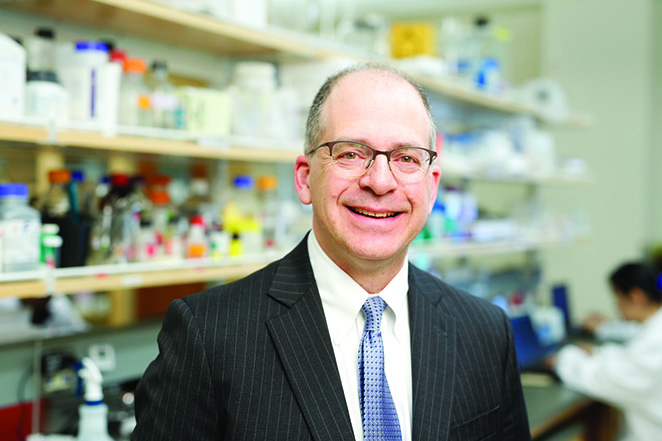
The search for MS solutions
The rates of multiple sclerosis (MS), a debilitating neurological disease, are among the highest in the world in Canada. In Saskatchewan, they may be even higher, where an estimated 3,500 to 3,700 people live with MS.
With $8.4 million in funding, the U of S has recruited Dr. Michael Levin as the inaugural Chair in Multiple Sclerosis Clinical Research. Levin, who began his seven-year term in March 2017, will lead the research program focused on identifying causes of MS and developing new or improved treatments.
“I’ve dedicated most of my adult life to exploring the causes of MS and the care of people with MS and I am grateful and humbled to be named the inaugural chair,” said Levin, a neurologist who was previously a professor in the College of Medicine at the University of Tennessee Health Science Center, and director of the Multiple Sclerosis Center and Laboratory of Viral and Demyelinating Diseases, in Memphis, Tenn.
Levin, who has always been interested in neurosciences and completed his medical degree at Pennsylvania State University and a post-doctoral fellowship focused on multiple sclerosis at the National Institutes of Health in Bethesda, Md., said his interest in MS was sparked in the early ‘90s.
“I met a couple of MS patients at the hospital. They were always strikingly young, intelligent and mid-career, so watching them become disabled was disturbing and at that time there were no FDA-approved medications.”
Since then, his research has focused on the relationship between viruses, autoantibodies and acquired DNA mutations as potential causes of multiple sclerosis.
At the U of S, Levin will lead a team of researchers, clinicians and students that includes Dr. Ilia Poliakov, director of the MS Clinic, and U of S researchers Dr. Katherine Knox, who focuses on MS and mobility, and Valerie Verge, director of the Cameco Neuroscience Research Centre, who focuses on nerve injury and repair mechanisms.
“There really is a fair amount of infrastructure here already,” said Levin. “As a research chair, I think one of my major responsibilities is to get the pieces here to collaborate … We will make significant advances in MS by providing world-class care and cutting-edge research, garnering a national and international reputation for excellence.”


